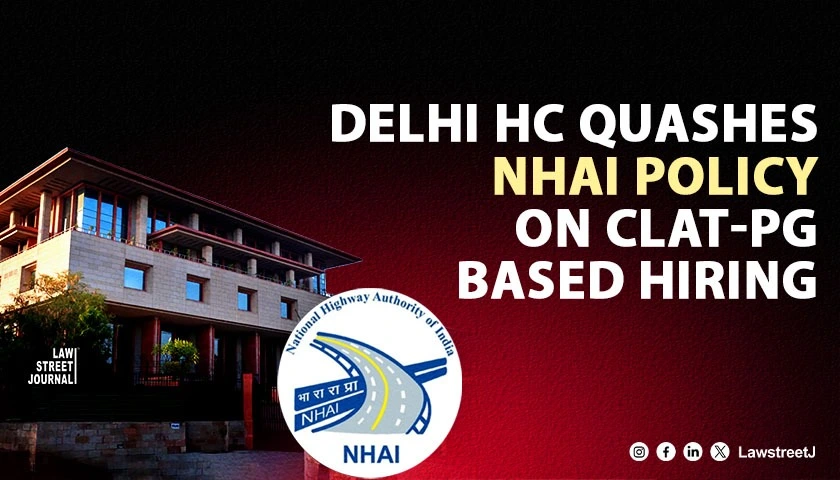New Delhi: The Delhi High Court has struck down the National Highways Authority of India’s (NHAI) recruitment criteria that relied solely on Common Law Admission Test Post-Graduate (CLAT-PG) scores for hiring Young Professional (Legal) positions, ruling that it violates constitutional principles of equality and non-arbitrariness.
Chief Justice Devendra Kumar Upadhyaya and Justice Tushar Rao Gedela delivered a comprehensive judgment, emphasizing that recruitment criteria for public employment must have a rational nexus with job requirements and cannot be based on examinations designed for academic admissions.
The court addressed Writ Petition No. 13490/2025 filed by advocate Shannu Baghel challenging NHAI’s notification dated August 11, 2025, which prescribed recruitment “on the basis of merit in CLAT (PG) score – 2022 onwards” for legal positions. The court noted:
“The proceedings of this writ petition under Article 226 of the Constitution of India have been instituted by an advocate practicing before this Court, taking exception to the notification issued by the National Highways Authority of India.”
The petitioner argued that the selection criteria were arbitrary and violated Articles 14 and 16 of the Constitution, contending that it excluded equally or more meritorious law graduates who appeared for other law entrance examinations. The court observed:
“It has been argued on behalf of the petitioner that the impugned notification violates Articles 14 and 16 of the Constitution of India, for the reason that selection based only on CLAT (PG) – 2022 scores is arbitrary.”
NHAI defended its policy by arguing that CLAT-PG was a nationally standardized examination that served as a reasonable benchmark for legal acumen. The authority stated:
“CLAT-PG is a national-level standardized examination conducted by a Consortium of National Law Universities, which is widely accepted as the most credible test for judging legal aptitude for post-graduate courses.”
However, the court found a fundamental flaw in NHAI’s reasoning, distinguishing between academic suitability and employment fitness. Chief Justice Upadhyaya observed:
“The criteria determining eligibility for pursuing higher courses (post-graduation) and the criteria for adjudging suitability for public employment, in our opinion, cannot be equated with each other.”
The court was particularly critical of the vague eligibility norms, noting a glaring inconsistency in the notification. The judgment stated:
“This criterion is absolutely vague for the reason that as per the said criteria, even if a candidate has secured zero or nil marks on his appearance in the CLAT (PG) examination, he shall be eligible; whereas if a candidate has not appeared in the CLAT (PG) examination, he shall be ineligible.”
In a sharp observation about the illogical nature of the criteria, the court stated:
“We do not see any rationale in treating a candidate to be eligible who appears in the CLAT (PG) examination and secures zero marks, and not treating a candidate who has not appeared in the said examination at all.”
The court emphasized the constitutional requirement for rational classification in public employment, citing established Supreme Court precedents. The judgment noted:
“Any policy decision relating to recruitment, including prescribing the qualification for eligibility/selection, is not amenable to judicial review unless the same is found to be arbitrary or otherwise invalid on the ground that such prescription does not have a rational nexus with the object sought to be achieved.”
The court rejected NHAI’s argument that other public sector undertakings used similar criteria, stating:
“Accordingly, because certain other organizations, including public sector undertakings, have been adopting CLAT (PG) scores as a basis for offering employment, is not a justification, for the reasons discussed above, for the NHAI to prescribe the impugned recruitment criteria.”
The bench highlighted the discriminatory nature of the policy against students from other universities, observing:
“It is also to be noticed that post-graduate courses in law are not offered only in the National Law Universities but also in various other Central and State Universities of repute.”
The court noted that many universities conduct their own selection processes through written examinations, interviews, or merit-based assessments, making NHAI’s exclusive reliance on CLAT-PG scores discriminatory against candidates from these institutions.
Conclusion:
“In view of the reasons given and discussions made above, we are fully convinced that the impugned ‘recruitment criteria,’ where selection for appointment to the post in question is to be made on the basis of merit in CLAT (PG) scores – 2022 onwards, is legally not tenable, being hit by Articles 14 and 16 of the Constitution of India.”
Appearance:
Mr. Shannu Baghel appeared in person along with advocates Mr. Ganpat Ram, Mr. Gorang Goyal, and others for the petitioner. Dr. Manika Aroa, CGSC, appeared with a team of advocates for the Union of India, while Mr. Ankur Mittal and Ms. Rabaica Jaiswal represented NHAI.
Case Title: Shannu Baghel vs. Union of India & Anr.



![Delhi High Court Sets Aside Arbitral Tribunal's Award Against NHAI in Highway Project Delay Case [Read Judgment]](/secure/uploads/2023/07/lj_9605_23374c2e-392c-4491-a2fe-f2f12fc5272f.jpg)
![Delhi Court Rejects Stay Request in Defamation Case Against Rajasthan CM Ashok Gehlot [Read Order]](/secure/uploads/2023/08/lj_5208_80de1ddc-d76a-4f7f-b180-408e3ae14fb4.jpg)







